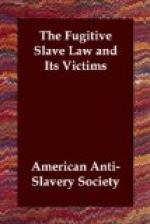[Fifteen Southern Representatives did not vote.]
DANIEL WEBSTER was not a member of the Senate when the vote on the Fugitive Slave Bill was taken. He had been made Secretary of State, a short time previous. All, however, will remember the powerful aid which he gave to the new compromise measures, and among them to the Fugitive Slave Bill, in his notorious Seventh of March Speech, [1850.] A few extracts from that Speech will show how heavily the responsibility of the existence of this law rests upon DANIEL WEBSTER:—
“I suppose there is to be found no injunction against that relation [Slavery] between man and man, in the teachings of the Gospel of Jesus Christ, or of any of his Apostles.”—Webster’s 7th March Speech, (Authorized Edition,) p. 9.
“One complaint of the South has, in my opinion, just foundation; and that is, that there has been found at the North, among individuals and among legislators, a disinclination to perform, fully, their Constitutional duties in regard to the return of persons bound to service, who have escaped into the free States. In that respect, it is my judgment that the South is right, and the North is wrong.” * * * * “My friend at the head of the Judiciary Committee [Mr. MASON of Virginia] has a bill on the subject now before the Senate, with some amendments to it, WHICH I PROPOSE TO SUPPORT, WITH ALL ITS PROVISIONS, to the fullest extent.”—Idem. p. 29.
He proceeded to assure the Senate that the North would, on due consideration, fulfil “their constitutional obligations” “with alacrity.” “Therefore, I repeat, sir, that here is a ground of complaint against the North well founded, which ought to be removed, which it is now in the power of the different departments of this Government to remove; which calls for the enactment of proper laws authorizing the judicature of this Government, in the several States, to do all that is necessary for the recapture of fugitive slaves, and for the restoration of them to those who claim them Wherever I go, and whenever I speak on the subject, and when I speak here, I desire to speak to the whole North, I say that the South has been injured in this respect, and has a right to complain; and the North has been too careless of what, I think, the Constitution peremptorily and emphatically enjoins upon her as a duty.”—Idem. p. 30.
In a speech in the United States Senate, July 17, 1850, made with an evident view to calm that Northern feeling which had been aroused and excited by his 7th of March speech, beyond the power of priest or politician wholly to subdue, Mr. WEBSTER said there were various misapprehensions respecting the working of the proposed Fugitive Slave Bill:—




